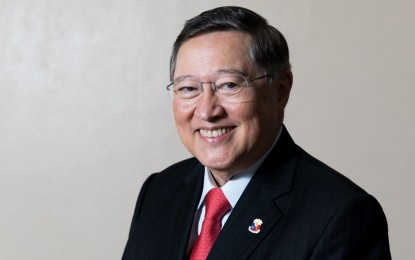
Finance Secretary Carlos Dominguez III. (File photo courtesy of DOF)
MANILA -- Finance Secretary Carlos Dominguez III does not see the need to review the Rice Tarrification Law yet, a mere four months after it took effect last March 5, and stressed the need to let the law “do its work”.
“No.” This was his reply when asked by journalists whether he thinks that there is a need to review the law.
Reports said some rice industry players are calling on President Rodrigo R. Duterte to order the review of Republic Act (RA) No. 11203, which he signed last February 14, since the price of palay has reached a break-even point.
Reports citing a Facebook post of Agriculture Secretary Emmanuel Piñol said he had a dialogue with farmers, who said they are on the losing end under the law since farm-gate prices of rice has fallen from an average of PHP20 a kilo for fresh palay.
Citing a Bangko Sentral ng Pilipinas (BSP) report, Dominguez said price of well-milled rice in September 2018 is about PHP49.56 a kilo while regular milled rice is around PHP45.75 a kilo.
In January 2019, well-milled rice’s price has declined to about PHP45.09 and that of the regular-milled rice went down to PHP41.41 per kilo.
As of June this year, price of well-milled rice fell further to around PHP42.92 a kilo and price of regular milled rice went down to PHP38.56.
Dominguez said the rice liberalization law is among the “most important legislative achievements of the 17th Congress and the Duterte administration”.
“For Filipino households, lower (rice) prices are already a reality,” he said, citing that a kilo of rice has gone down to about PHP5 to PHP10 per kilo in some areas.
Last year, inflation peaked at 6.7 percent in September and October due to elevated rice prices but its contribution to the rate of price increases last June has become negative, he said.
The Finance chief said the Department of Finance (DOF), Department of Trade and Industry (DTI), Department of Agriculture (DA) and the National Economic and Development Authority (NEDA) “have been continuously monitoring import and retail prices to check whether traders are earning fair, and not excessive, profits”.
“We expect that the effects of enhanced competition among importers will be felt even more through additional retail price reductions,” he said.
Dominguez assured the public that “a few coordinated actions are being considered in case the data show evidence of abuse over the short term.”
He said personnel from these departments “will also continue to proactively monitor the implementation of the RCEF (Rice Competitiveness Enhancement Fund (RCEF) farmer support programs as well as the level of collected import tariffs and are considering additional farmer support programs in advance, in case collections go above PHP 10 billion.”
Under the Rice Tarrification Law, RCEF will be established with a PHP10 billion annual financial support for six years starting 2019. The fund will be used for the modernization of rice farms and increase local farmers’ productivity.
Dominguez said the Department of Budget and Management (DBM) on Thursday already released PHP5 billion for the RCEF.
He also pointed out that “a significant number of smallholder farmers are net rice consumers and produce less than their annual household requirement”.
“They already benefit as consumers through lower retail prices, but also through cheaper production with implementation of the rice fund,” he said.
Thus, he stressed that “we should let the rice liberalization law, which is three decades late, do its work and give the economy time to adjust for the further easing of rice prices for more than 100 million Filipinos.”
“We should also implement the rice fund efficiently and effectively for our two to three million rice farmers,” he added.
Meanwhile, DBM officer-in-charge Janet Abuel, in a briefing Thursday, said the Executive branch is still discussing when the additional PHP5 billion will be released.
“I don’t want to pre-empt that but we’re talking. The collections are coming in from the tariff but we will look at everything, all the circumstances as whole, then we make decision,” she said.
“But for us what is important is a clean, clean PHP5 billion for the RCEF,” she added referring to the first batch of RCEF fund. (PNA)
